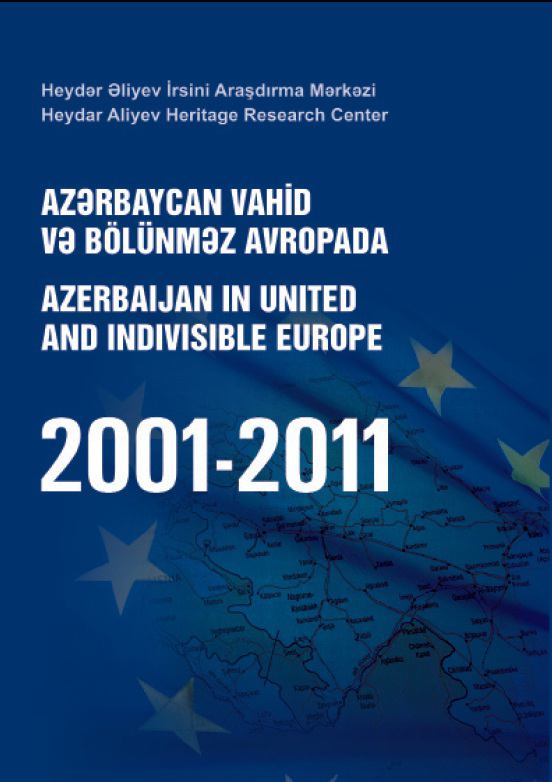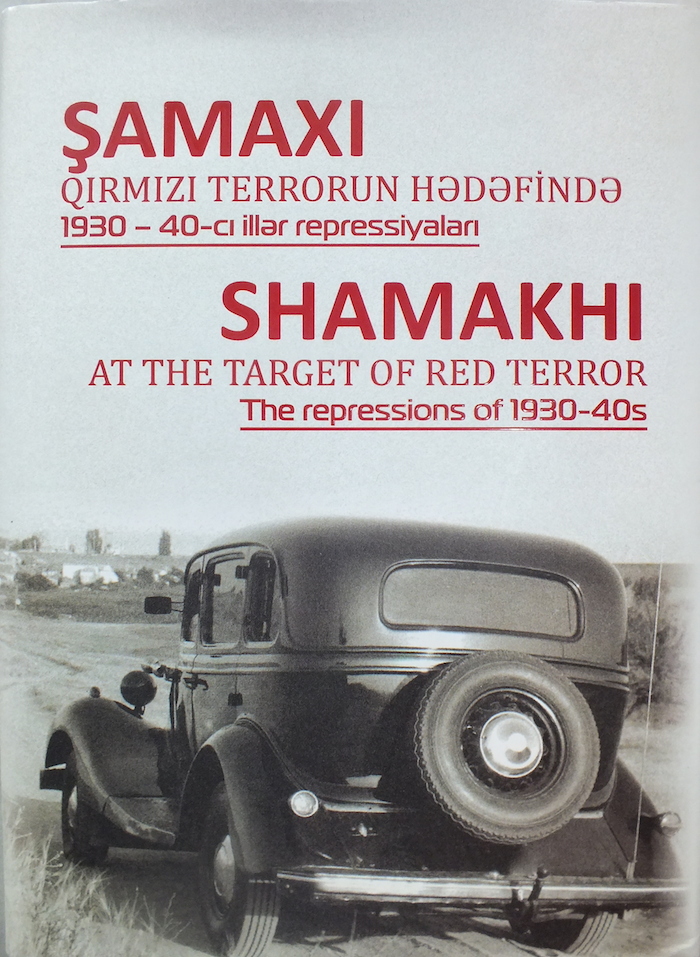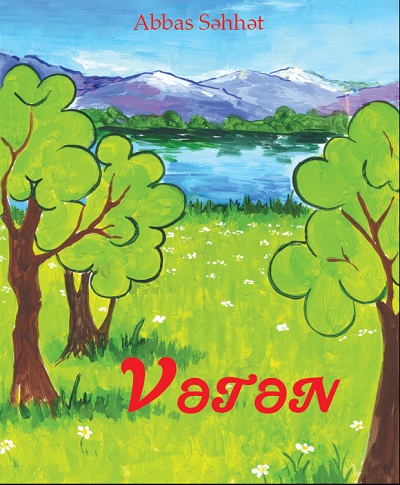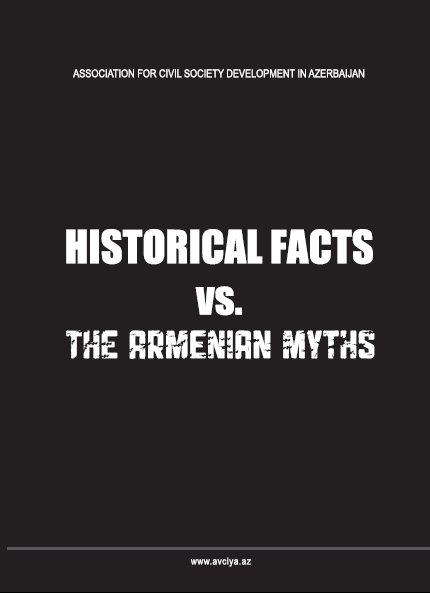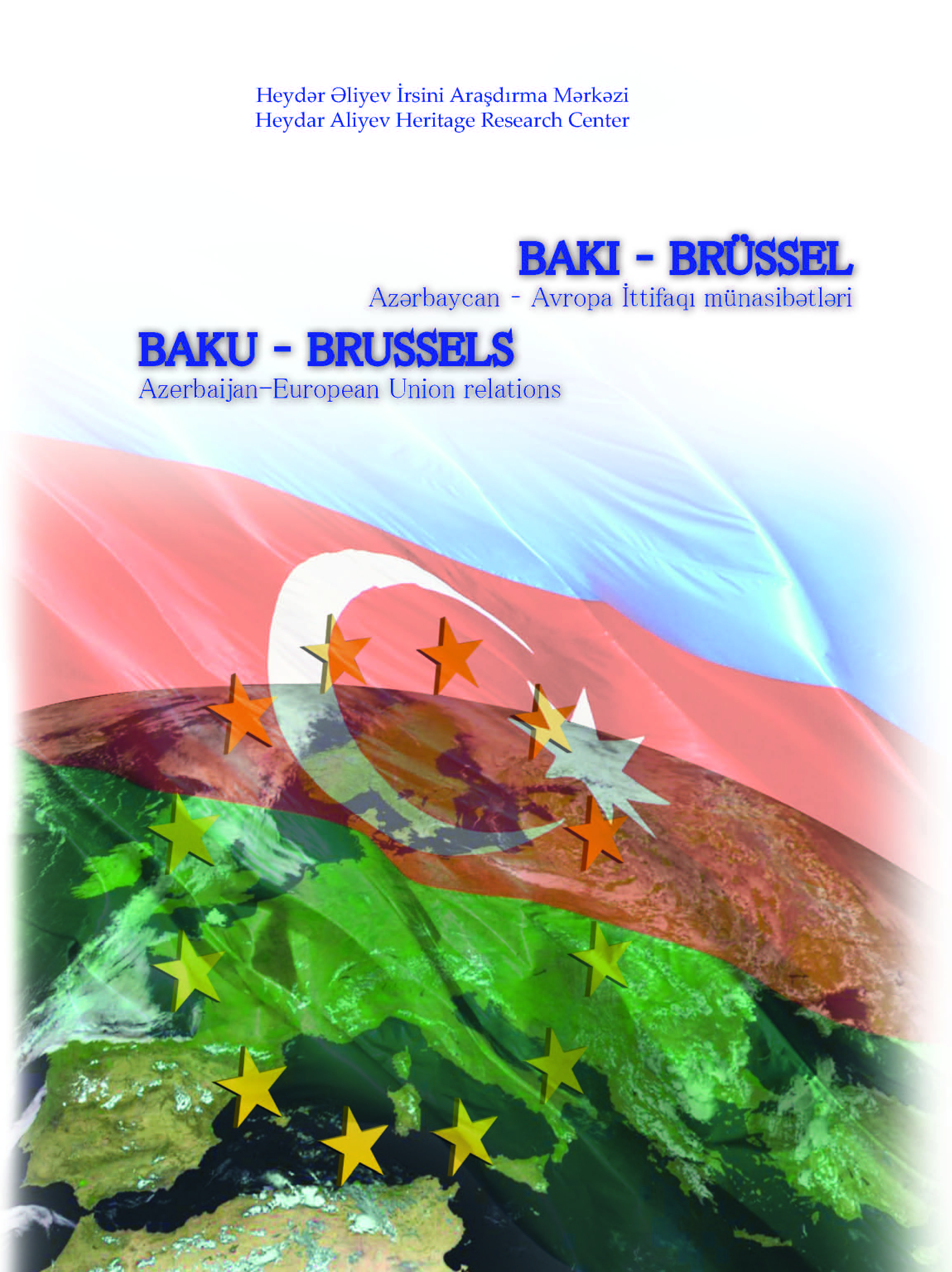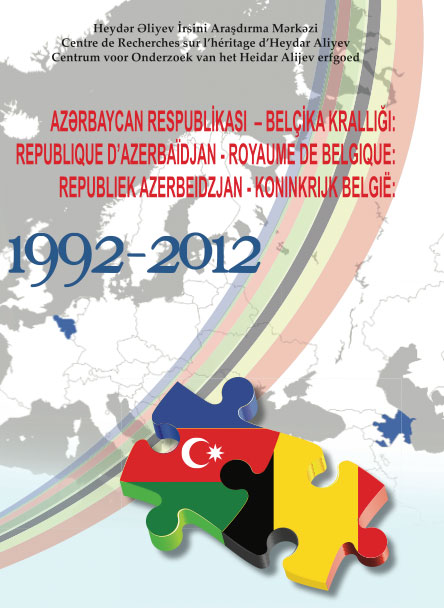Explanatory comments by MP Elkhan Suleymanov regarding the Information Note by Pedro Agramunt
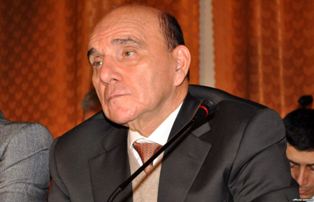 Explanatory comments
Explanatory comments
by Mr. Elkhan Suleymanov, member of Azerbaijani delegation,
regarding the Information Note on
“Azerbaijan’s Chairmanship of the Council of Europe: What follow-up on respect for human rights?” (October 21, 2014) by Mr. Pedro Agramunt, Rapporteur on Azerbaijan in the PACE Committee on Legal Affairs and Human Rights
The Information Note by the Rapporteur submitted both the positions of local NGOs and authorities on the information provided about the situation of human rights, as well as the considerations of international NGOs.
We kindly present to you the following explanatory comments to the provisions of Information Note:
 Explanatory comments
Explanatory comments
by Mr. Elkhan Suleymanov, member of Azerbaijani delegation,
regarding the Information Note on
“Azerbaijan’s Chairmanship of the Council of Europe: What follow-up on respect for human rights?” (October 21, 2014) by Mr. Pedro Agramunt, Rapporteur on Azerbaijan in the PACE Committee on Legal Affairs and Human Rights
The Information Note by the Rapporteur submitted both the positions of local NGOs and authorities on the information provided about the situation of human rights, as well as the considerations of international NGOs.
We kindly present to you the following explanatory comments to the provisions of Information Note:
I
Section on Recent arrests of human rights defenders and other civil society activists
1. Paragraph 14 of Information Note states: “According to the representatives of the few opposition parties I met, there are currently 140 “political prisoners”, according to Leyla Yunus’ list there are 198, according to 4 other NGOs, there are 28. We have also heard that some other NGOs are currently compiling lists of 81 “political prisoners”. All this is confusing, especially since these lists evolve constantly, with people being released thanks, inter alia, to presidential pardons, and new people being arrested and charged.”
Explanation: The difference in lists and number of alleged political prisoners in the lists of different NGOs demonstrate that these NGOs have different interests. The statements and reports by international organizations based on biased information create conditions for some NGO representatives in our country to turn the issue of so-called “political prisoner” into an illegal business.
At the same time, this point shouldn’t establish a negative opinion about all Azerbaijani NGOs. Over 3500 NGOs were registered in Azerbaijan, 90% of which is engaged in sound activity and contributes to the development of civil society.
2. Paragraph 16 of Information Note notes: “On 16 December 2013, Anar Mammadli, the Chair of the Election Monitoring Centre (EMDS), an organisation which was critical about the conduct of the presidential elections in October 2013, was arrested and placed in detention on various charges, in particular “tax evasion”, “abuse of official authority” and “illegal business activity”. On 26 May 2014, he was sentenced to 5 and a half year imprisonment by the Baku Court of Grave Crimes in first instance. His colleague, Bashir Suleymanli, executive director of EMDS, was sentenced to three and half year imprisonment. Annar Mammadli was recently awarded with the Parliamentary Assembly’s Vaclav Havel Human Rights Prize 2014.”
Explanation: Anar Mammadli, Chairman of Election Monitoring and Democracy Studies Center, used the name and bank accounts of Public Union “International Cooperation of Volunteers” chaired by Elnur Mammadov, in order to avoid taxes. Anar Mammadli received large amount of money and unregistered grant (USD 163.250) without paying taxes through that NGO.
As the result of investigation, Anar Mammadli and his deputy Bashir Suleymanli, as well as Elnur Mammadov were accused of misappropriation, illegal entrepreneurship, tax evasion, abuse of power and forgery in office.
By the judgement of the Baku Court on Grave Crimes (delivered on 26 May 2014) Anar Mammadli was sentenced to 5.5 years, Bashir Suleymanli to 3.2 years of imprisonment and Elnur Mammadov was sentenced to 2 years of imprisonment conditionally.
On November 11th of this year, the cassation appeal of Anar Mammadli and Bashir Suleymanli, who are being detained in the Supreme Court of the Republic of Azerbaijan, was considered and overruled.
3. Paragraph 17 of Information Note reads: “On 14 July 2014, Hasan Huseynli, leader of “Intelligent Citizen”, a respected NGO based in Ganja, was sentenced to six years of imprisonment on charges of “hooliganism” and “stabbing”. He led educational projects involving young people in his region.”
Explanation: Hasan Huseynli was sentenced for the incident on March 31, 2014. He quarreled with Gahramanov Arzu Eldar in the street in Ganja and attacked him with knife. Then the witnesses of the incident gave evidences.
Hasan Huseynli was released under the Pardon Decree by President of the Republic of Azerbaijan on October 17, 2014. He continues his activity at the moment. In November of this year, Hasan Huseynli attended Civil Society Forum of EU’s Eastern Partnership program held in Batumi, Georgian Republic.
4. Paragraph 18 of Information Note states: “Leyla Yunus, Director of Institute for Peace and Democracy, and her husband Arif Yunus were charged with treason, tax evasion, and illegal entrepreneurship.”
Explanation: Taking into account an exaggerated and biased campaign on Leyla Yunus in European institutions, we consider it necessary to add the following information to Paragraph 18 of Information Note:
Besides chairing an unregistered Institute for Peace and Democracy, Ms. Yunus acted as the alleged director of the Society of Women of Azerbaijan for Peace and Democracy, registered on the 27th of March, 1996. There are a series of illegalities that came todaylight after a long investigation and they are basis for their arrests.
The most important accusation is the one of treason. Ms. Yunus together with her husband stand accused of having managed contacts with Armenian interests, Azerbaijan having a fifth of its territory under occupation by Armenia. They arranged the transfer via Georgian territories of individuals to be recruited by Armenian intelligence services for the purpose of data gathering and information collection on the security situation of Azeri troops near the contact line with Armenia. They allegedly intermediated payments and other material gains for such people andthe prosecution has also found evidence that Ms. Yunus herself was involved in such data gathering on the security, economic and technical supply of Azerbaijan.
She was also allegedly involved in a series of negotiations with Armenian contacts on the recognition of sovereignty of the illegal regime in Nagorno-Karabakh in exchange for the return of other occupied provinces of Azerbaijan. Such negotiations were neither sanctioned nor improved.
On a financial level, Ms. Yunus managed the accounts of the Society of Women of Azerbaijan, registered in Unibank OJSC on the 21st of November 2002. This organization received a number of international grants for various projects, including from the U.S. National Endowment for Democracy (NED), the German Marshall Fund, OSI Assistance Foundation and others, between 2006 and 2014. It was discovered that Ms. Yunus authorized three transfers of AZN 167.199, USD 620.878 and USD 263.745 from the accounts of the NGO to other, personal accounts,afterwards cashing the sums personally. She cashed USD 88.468 and covered the transaction with falsified documents, depositing USD 71.000 to her personal accounts. Later on, she withdrew USD 78.130, on April 24th 2012, including the interest of the initial deposited and transferred it to the accounts of her husband, Mr. Arif Yunus at Unibank, who afterwards immediately moved the sums to his other accounts in the Czech Republic, at Sberbank CZ.
This was an act in breach of several fiscal and accounting laws of Azerbaijan, as well as the legislation concerning the functioning of non-governmental organizations.
Lastly, Ms. Yunus also conducted private and unregistered business activities, acquiring AZN526.943 from unregistered grants. Furthermore, this all added up to AZN 369.378 in tax revenues evaded by her over the indicated time period.
All the information the above are the facts surrounding the highly mediatized case of Ms. Leyla Yunus. Ultimately, it will be for the court to decide on the validity of the accusations, and only for the courts. At the same time, we believe that the final decision on the cases of Leyla Yunus and Arif Yunus should be taken by the court. This is inadmissible to make political speculations without any judicial decision.
5. Paragraph 19 of Information Note claims: “Leyla Yunus’ health has deteriorated since her arrest and the prison authorities refuse to provide her with appropriate treatment, despite her diabetes and problems with her kidneys. At the beginning of September 2014, she was attacked by her cellmate and the prison authorities allegedly failed to protect her.”
Explanation: According to the information of Main Medical Department of the Ministry of Justice of the Republic of Azerbaijan, the situation of Leyla Yunus detained in Baku Penitentiary Facility is stable. She has no any health problems.
Leyla Yunus is regularly analyzed in laboratory, besides, an endocrinologist regularly examines the level of her diabetes. She has no any problem with liver and relevant examination had no negative results. She was even offered to pass USM for several times, but Leyla Yunus refused saying that she had no need.
It is noted that Leyla Yunus has diabetes, and she receives adequate medicines. The level of her diabetes is under control. Both the penitentiary facility and she herself has a device to measure the level of diabetes.
On December 29, 2014, the Azerbaijani Government organized accused Leyla Yunus’s full examination, namely blood analysis, examination of abdominal cavity, pelvic organs and thyroid gland, Doppler USM of carotid arteries, vertebral arteries, and lower extremity arteries, magnetic resonance tomography (MRT) of thoracic organs, cerebrum, and full abdominal cavity, ECG, Echocardiogram, and heart echography, as well as consultations of ophthalmologist, neurologist, and oncologist with the participation of Professor Dr. Christian Vitt, Head of Department of well-known German hospital “Charite”, and highly specialized doctors of Azerbaijan on different spheres, namely professor Murad Muradov, professor Garay Garaybayli, professor Rauf Aghayev, and PhD Rovshan Hasanov at Republican Diagnostic Center, basing on principles of humanity and for ending rumors on accused Leyla Yunus’s health. Consequently, minutes were compiled by group of international physicians, the results were documented, and the video of process of examination was taken. Dr. Christian Vitt signed the minutes, conforming his attendance in all medical examinations with the application of new diagnostic methods and in accordance with internationally recognized diagnostic and ethic standards.
6. Paragraph 20 of Information Note states: “On August 2, human rights activist Rasul Jafarov, founder of the NGO “Human Rights Club”, was placed in pre-trial detention on charges of tax evasion, illegal entrepreneurship, and abuse of power.”
Explanation: According to the Article 25 of the Constitution of the Republic of Azerbaijan, citizens are equal before law and court. 1165 persons (389 in 2011, 373 in 2012, and 403 in 2013) were brought to criminal responsibility for tax evasion in Azerbaijan for the last three years. Rasul Jafarov is also an Azerbaijani citizen, who was brought to criminal responsibility for tax evasion, and he is also equal before the court.
Rasul Jafarov was found to have pursued economic activities with grant agreements not duly registered under the legislation, and was suspected to have obtained an income on the amount of AZN147.900 (over EURO 140.000) and evading from state tax on the amount of AZN 6.162 through oficially unregistered NGO.
The conviction act on Rasul Jafarov’s case was submitted to Baku City Court of Grave Crimes on January 5, 2015. During the investigative period, additional charges were raised against R.Jafarov under Articles 179 (assignment) and 313 (document forgery).
7. Paragraph 21 of Information Note states: “On 8 August 2014, Intigam Aliyev, lawyer and the Chairman of the Legal Education Society, was placed in pre-trial detention on charges of tax evasion, abuse of power and illegal entrepreneurship. His office and home were searched and his computer and files confiscated. As Rasul Jafarov, he is also suspected of tax evasion on an income of some 60.000 Euro.”
Explanation: The detention of Intigam Aliyev has nothing to do with his activity, the lists, he jointly prepared with others, etc. Intigam Aliyev is the Chairman of the Legal Education Society. According to the Law of the Republic of Azerbaijan on “Non-governmental organizations”, Public union, as it is settled as aims of founding documents, is a voluntary, self-controlled, non-governmental organization established under the initiative of several physical and (or) legal entities with common interests, whose main purpose is not to gain profit as a result of the activity and share it between the members of the organization. Intigam Aliyev was detained for violations in the activity of the Public Union. He was elected the Chairman during general meeting of founders and members. He is suspected to have carried out an illegal entrepreneurship with grant agreements not duly registered under the legislation, and was suspected in obtaining an income on the amount of AZN 66.204, amounting to a tax evasion of AZN 8.706. The materials confiscated from Intigam Aliyev, as well as case materials regarding the procedures considered by ECtHR.
The investigation on Intigam Aliyev’s case was completed, and the conviction act was forwarded to Baku City Court of Grave Crimes.
8. Paragraph 23 of Information Note reads: “?mar Mammadov, a popular blogger and founder of a pro-opposition youth movement, was sentenced to 5 years for allegedly intending to sell drugs and, in May 2014, 8 activists from the NIDA civic movement were sentenced to imprisonment of between 6 and 8 years, for hooliganism, illegal possession of drugs and organising or participating in mass disorder.”
Explanation: In March 2013, eight members of the NIDA Civic Movement were arrested while preparing a mass protest without authorization, and were found in possession of explosives (Molotov cocktails). A search ofthe premises also uncovered narcotics and large amounts of undeclared foreign currency (up to EURO 100.000). Several judicial investigations were opened, concerning these finds.
Mr. O. Mammadov was found guilty by the Baku Court of Grave Crimes on the 4 th of July 2014 and sentenced to 5 years imprisonment for illegal possession of narcotics (6.134 grams of heroin). His lawyer submitted an appeal and the case is currently on-going.
Detained NIDA activists Bakhtiyar Guliyev and Shahin Novruzlu applied to President of the Republic of Azerbaijan for pardon and expressed their repentance. The fact that thse activists and the others, allegedly detained for their political views, are deliberately called “prisoners of conscience” proves that these allegations are unfounded.
President of the Republic of Azerbaijan signed a pardon decree on October 17, 2014, and the decree was also applied to 84 prisoners. Here inclued 2 NIDA activists, namely Bakhtiyar Guliyev and Shahin Novruzlu.
Other members of NIDA Civic Movement, who were detained in Baku Penitentiary Facility, namely Rashadat Akhundov, Rashad Hasanov, Uzeyir Mammadli, Zaur Gurbanly, Mammad Azizov, and Ilkin Rustamzade, also applied to President Ilham Aliyev on September 28, 2014.
President of the Azerbaijan Republic Ilham Aliyev signed a pardon decree on December 29, 2014. The decree is applied to 86 Azerbaijani citizens and 1 (one) Turkish citizen. The prisoners pardoned include two members of NIDA Movement, namely Uzeyir Mammadli and Zaur Gurbanly.
9. Paragraph 23 of Information Note claims: “Faraj Karimov, his brother Siraj Karimov, and Murad Adilov, who were detained on drug charges are political activists.”
Explanation: Faraj Karimov, his brother Siraj Karimov, and Murad Adilov are not known to Azerbaijani society and are not distinguished with political activity at all.
The legislation of the Republic of Azerbaijan provides for criminal and administrative responsibility for purchase, storage, transportation, and sale of drugs. The people commiting such actions are brought to responsibility.
10. Paragraph 25 of Information Note claims: “On 8 August, Emin Huseynov, the Chair of the Institute for Reporters’ Freedom (IFRS) was allegedly prevented, by the police, from traveling to Turkey for medical treatment. On 8 August, the offices of the IFRS and Mr Huseynov’s mother home were searched. Mr Huseynov was issued a travel ban and a criminal case is now pending against him. Emin Huseynov is suspected to have evaded tax payment on an income of 560.000 Euro from foreign grants, and he is currently reported to hide in a foreign embassy in Baku. As he is evading investigation, he is now searched by the police and is risking inprisonment.”
Explanation: The Azerbaijani authorities addressed the Swiss Embassy on the speculation that Emin Huseynov hides in a foreign embassy in the country. The authorities ensured that Mr. Huseynov won’t be detained if he gives evidence to the investigation. Nevertheless, he still hides from investigation.
11. Paragraph 26 of Information Note comments: “On 21 August 2014, Ilgar Nasibov, a journalist and human rights activist from Nakhichevan – the Azerbaijani exclave – was severely beaten by unidentified people. He was found unconscious in his office with severe head trauma and broken face bones. Mr Nasibov and his wife Malahat Nasibova, also a journalist, have been supporting the victims of human rights violations in their region through the Development Resource Centre. Following the incident, NGO sources specify that no criminal investigation has been opened and beforehand, the couple reported that they had received numerous threats. These NGO sources however are contradicted by a publication by U.S. State Department, who are stating that the police responded immediately, and the prosecutor’s office initiated an investigation.”
Explanation: A criminal case was launched under the Article 127.1 (deliberate causing of less serious harm to the health) of the Criminal Code of the Republic of Azerbaijan, a few days following the fact that Ilgar Nasibov was severely beaten by unidentified people. The hearing was held at Nakhchevan Court on November of this year. Taking into consideration Nasibov’s refusal of his complaint, the court decided to terminate the case.
There are several control mechanisms, alongside with administrative control for detention facilities in Azerbaijan, which include Ombudsman, National Preventive Mechanism Group, and Public Committee for Penitentiary Service. Moreover, Azerbaijan is open to any cooperation in this regard. The Joint Working Group on Human Rights was restored during the meeting (meeting on restoration) on October 22, 2014. This Working Group previously functioned between 2005 and 2008 at the initiative of Mr. Thorbjorn Jagland, CoE Secretary General and Mr. Ilham Aliyev, President of the Republic of Azerbaijan and closed down due to the violation of agreement provisions by PACE (as the issue of prisoners was discussed and resolved on national framework, the PACE agreed not to appoint a rapporteur). The Working Group includes representatives of the government and national human rights defenders, as well as Mr. Alexander Gessel, representative of Secretary General. The main goal of the Working Group is to monitor and prepare appropriate recommendations on the prisoners, who are under criminal investigation and are declared as convicted (accused), and the court decision about whom entered into force.
II
Paragraphs 28 – 31 of Information Note deal with freedom of information in Azerbaijan. Therefore, we consider it necessary to overview the actual situation in the sphere of freedom of information in the country:
Freedom of expression
According to the Article 50 of the Constitution of the Republic of Azerbaijan, everyone is free to look for, acquire, transfer, prepare and distribute information through lawful means; freedom of mass media is guaranteed; state censorship in mass media, including press is prohibited.
According to the Article 14 of the Law “On Mass Media”, “For the the establishing of print publications there is no need to get agreement from the authorities.”
There are currently 4957 newspapers (print and online) and information agencies in Azerbaijan. Moreover, 8 republic-wide, 14 regional and 12 cable televisions, as well as 11 radio-channels, and multiple online television channels.
There is no any public authority regulating the activity of press. The Press Council was established in 2003 as a mechanism to publicly regulate the relations between the society, public authorities, and mass media outlets. This Council is a self-controlled non-governmental institution.
“The Concept on Sate Support for Mass Media Development in the Republic of Azerbaijan” was adopted under Presidential Decree in 2008. The Concept provided for the establishment of special fund for state support for mass media development. Following the adoption of the concept, State Fund for the Support of Mass Media Development under the President of the Republic of Azerbaijan.
The Fund supports media in different spheres, where include development of freedom of thought, speech, and information, as well as pluralism, strengthening of material and technical base of mass media, improvement of financial and social state of journalists.
Over 80% of annual budgets of many opposition newspapers functioning in the country is financed by this fund. The practice of European forms of support for mass media development was studied before the establishment of the fund.
State Fund for the Support of Mass Media Development under the President of the Republic of Azerbaijan has provided regular financial assistance to more than 30 media outlets and different basic newspapers, including mainly “Azadlig” and “Yeni Musavat” since 2011.[1]
Most of media outlets, as well as “Azadlig” paper were provided with office belonging to Service of Head of Administrative Department of the President of the Republic of Azerbaijan and located in the center of capital Baku for symbolic price (10 times less than an actual price).
Residential complex with total price of 22 mln. AZN was built and gratuitously distributed among journalists by the Fund at the expense of state budget. During the process, journalists critical of government and journalists close to government were not discriminated, and the partition was conducted according to number of family members.
This assistance by the state didn’t aim to “deprive journalists of loyalty”. According to independent experts, as state support increased, the number and severity of critical articles increased as well, on the contrary, such newspapers gained additional means to deeply analyze the governmental activity.
The Internet is not limited in Azerbaijan. The VII Internet Governance Forum jointly organized by UN and Azerbaijani Government in Baku in November of 2012 noted that freedom of Internet is fully ensured in Azerbaijan. The prohibition of any resources of Internet in the country was not reported. The social media is widely used.
Nevertheless, some reports were distinguished with biased approaches in their indexes of freedom of Internet in Azerbaijan. The indicators regarding “Freedom of Internet” contained in the report by Freedom House on “Freedom on the Net 2011”, which reflects global assessment of Internet and digital media, places Azerbaijan in the list of countries, where “Internet is partially free”. The indexes of “Freedom of Internet” in many world countries were evaluated in the report, and Azerbaijan is on the 20th place (48 points) for this index.[2]
III
Paragraphs 32 – 34 of Information Note deal with freedom of assembly in Azerbaijan. Therefore, we consider it necessary to overview the actual situation in the sphere of freedom of assembly in the country:
The freedom of assembly
According to Article 49, “Everyone has the right to freedom of assembly. Everyone has the right, having notified respective governmental authorities in advance, peacefully and without arms, assembly with other people; organize meetings, demonstrations, and processions, pickets.”
The Law “On Freedom of Assembly” was adopted on 13th November 1998.
Following the ratification of the European Convention on Protection of human rights and fundamental freedoms by the Republic of Azerbaijan[3], due to incompatibilities of some provisions of the law with provisions of the Convention, the Parliament of Azerbaijan improved its legislation in cooperation with Venice Commission[4]. The fundamental amendments entered into force on 30th May 2008. The Venice Commission also positively commented on the Law, stating its compatibility with international standards.
Basic principles adopted by OSCE/ODIHR, as well as requirements of Presidential decision on Baczkowski and others v. Poland (Application no. 1543/06) were taken into consideration during the process of amending the Law “On Freedom of Assembly”. Therefore, the requirement of Article 13 of European Convention on Protection of human rights and fundamental freedoms (The Right to an effective remedy) was implemented. Currently, the courts review and make a decision regarding complaints on decisions of local executive power prohibiting the assemblies after the notice on assemblies at least 3 days prior planned assemblies.
According to Article 9.6 of the Law, “Relevant bodies of executive power shall provide a special area for conducting gatherings, meetings and demonstrations in each city and region. A list of places proposed for gatherings, meetings and demonstrations shall be published in a press and shall be brought to the population by other means. Organizers can choose one of the places proposed for gatherings, meetings and demonstrations. Upon petitions a relevant body of executive power can change the list of proposed venue of gatherings, meetings and demonstrations.”
Based on these provisions, special venues were defined in over 70 cities and settlements under the decisions of local executive power. 12 venues were defined in capital Baku, and they cover all administrative territorial units. Some of previously defined venues were not satisfactory and caused to refusal of political parties and public organizations. Afterwards, the number of venues were increased and replaced by more easily accessible venues. A large stadium located in the territory of traditional assemblies of political parties in the centre of city (opposite to “Galaba” cinema) was defined as a venue for assemblies. The territory is densely populated and contains the stops of all public transport means, including bus and subway.
Currently, mass demonstrations are held in one of these venues with prior written warning submitted within due time. Nevertheless, the police prevented attempts for mass assemblies for several times in front of and near strategic facilities as specified by the law, and administrative penalties were applied against violators (in the form of money or detention for 15 days).
According to Article 13.3, “Participants shall enjoy the right of freedom of thought and speech orally and in written during assemblies in accordance with the Constitution of the Republic of Azerbaijan.”
During the last year, a number of assemblies, including spontaneous ones have been held in different parts of the country, in particular in the central areas of Baku. The recent two of these assemblies were held by the “National Council of Democratic Forces” (NCDF) at the stadium of the Yasamal sports complex, formerly Mahsul stadium, located near the “Inshaatchilar” metro station in the centre of Baku on the 12th of October and 9th of November 2014. The location for holding the assembly was provided by the Executive Power of Baku City after an official request by the NCDF. The assembly lasted from 15:00 to 17:00 without any restriction.
Generally, there were no reports of the police intervention with peaceful assemblies or sanctioning for holding assembly in accordance with law. There were no reports of any restrictions to speeches in mass events.
IV
Paragraphs 35 – 37 of Information Note deal with freedom of association in Azerbaijan. Therefore, we consider it necessary to overview the actual situation in the sphere of freedom of association in the country:
The freedom of association
According to Article 58 of the Constitution, “Everyone has the right to establish any union, including political party, trade union and other public organization or enter existing organizations.”
There exist relevant legislation on political parties, tradeunions, non-governmental organizations, as well as other legislative acts for ensuring legal functioning of these organizations.
One of basic principles of Law “On Non-Governmental Organizations (public unions and funds)” establishes that state registration of NGOs is voluntary. According to this principle, the state registration is a right, not an obligation. An NGO is entitled to pass or not to pass state registration. NGOs obtain a status of legal person through state registration.
The government recognizes NGOs without the status of a legal person and their unions as a side. The representatives of such NGOs may be represented in different commissions, working groups, and more constant institutions founded by the government.
According to the law, the closing down of an NGO under a judicial decision is in fact considered as a cancellation of its legal status. Such kind of practice is a rare case in our country. Thus, only 1 NGO (Election Monitoring Centre Public Union) has been closed down under a judicial decision for the last 11 years. The reason for such decision was a conflict between founders and complaints by some of them. However, despite the fact that this NGO was closed down as a legal person, it continued (and continues) functioning, and thus, the annual budget of such organizations are more compared to that of the functioning with registration.
The public authority or the authority appointed by the state, which controls the financial and agenda of NGOs may apply sanctions depending on the results of auditing and inspection. The International Center for Non-profit Law, which studies the practice of sanctions against NGOs violating laws within their activities and programs with different countries, has interesting generalizations.
According to the International Center for Non-for-profit Law, “For example, an NGO may be penalized from € 50 to € 500 in Bulgaria. An NGO in Poland may penalized at 50 000 zloties (€ 11 300) for failing to fulfill the requirements regarding documents. Nevertheless, this penalty may be cancelled only if that NGO immediately fulfills such requirement. A fund may be penalized from 10 000 to 100 000 krones (€ 2500-25 000) in Slovakia for failing to submit a report. Penalties may be applied both to NGOs and responsible persons in several countries (Bosnia, Croatia, Serbia, and Montenegro).”
Some countries have more severe sanctions against non-profit organizations. Here include closing down of organizations or cancellation of tax concessions, deprivation of status of social benefit organization (in this case the organizations is deprived of all concessions, including tax concessions), and penalties on the amount of over € 50 000.
Thus, the legislation of the Republic of Azerbaijan is more liberal. The legislation provides for penalties to physical persons, state officials, and legal persons accordingly on the amount of 1000-2000 AZN, 1500-2500 AZN, and 5000-7000 AZN on NGOs for failing to submit or to submit in time reports on grant contracts to competent executive power. Although the number of NGOs, which do not submit grant contracts for registration or do not submit timely and properly during 2013, the Ministry of Justice made concessions, noted the explanations of NGOs, and did not apply sanctions in most cases. Nevertheless, according to official information of the Ministry, “the decision on 3 administrative punishments was taken due to the fact that NGOs had not submitted the copies of grant contracts (decisions) to the Ministry of Justice for registration in contradiction with Paragraph 2.1 of “Rules for Registration of Contracts (Decisions) of Awarding (Receiving) Grants”. Consequently, a discipline punishment on total amount of 7000 AZN (seven thousand) was applied.[5]”
The Ministry of Justice has not applied any penalties (for failing to submit grants for registration or violating the regulations) to any NGO for the first 6 months of 2014. Generally, sanctions applied by the Ministry of Justice controlling the regulations activity by NGOs decrease year-by-year, despite the fact that the amount of penalties have been considerably increased. Thus, totally 13 000 AZN penalties were applied to 7 NGOs in 2011. This figure was 7000 AZN to 3 NGOs in 2013, and the first half of the year 2014 did not see any penalties at all.
According to Code on Administrative Violations, penalty on the amount of 2400 AZN is applied to NGOs for not submitting or not submitting timely (by 31st March of each year) the annual financial report to the Ministry of Finance. However, none of NGOs was subject to such penalties so far.
The sanctions, especially severe sanctions should not be considered as a campaign directed to punishing organizations. Their goal is to make a warning, and an organization is given time to eliminate the violation before applying sanctions. At the same time, sanctions are applied by experienced and competent authorities.
This is common for many European countries. For example, a court makes a judgment on deprivation of the organization from the status of “social benefit organization” (i.e. organization benefiting from tax concessions) at the presentation of prosecutor-general in Hungary. This decision is valid only after a prior warning to that NGO and allocation of time for elimination the violation. In Poland, if an NGO eliminates the violation following a warning, the Ministry of Labor and Social Policy submits a document that this NGO’s registration is annulled.[6]
As mentioned above, sanctions are applied if the NGO in question do not eliminate violations (regulations violations, financial violations, violations on program and institutional activities, etc) following a prior warning and time allocated for this purpose.
The Council of State Support to NGOs under the auspices of the President of the Azerbaijan Republic is a major state donor for financing of NGOs in 2008. The Council is composed of 11 members, 8 of which are NGO representatives nominated by NGO groups and 3 of which are governmental officials.
Various reports of many international and foreign organizations provided information about transparency and discrimination in the allocation of donations by the Council of State Support to NGOs under the auspices of the President of the Azerbaijan Republic. Beginning from 2010, the annual reports of the US State Department on “The situation of human rights in the country” note that there is no discrimination in donations allocated by the Council and that the NGOs critical of the government also have an opportunity to receive donations[7].
737 applications were submitted to the Ministry of Justice by 220 organizations regarding the registration of 1817 contracts (decisions) on receiving grants within 2013. The grants on the amount of 67.217.026 AZN were received from 173 donor organizations under these contracts (decisions).
35% of total amount or 23.550.942 AZN of these grants were awarded by foreign donors (regarding projects on education, enlightenment, the youth, social problems, civil society development, human rights, etc).
65% of grants was provided by 29 local donors (12 of them are state organizations)[8]. Thus, the finance allocated to NGOs by local donors (mostly state) amounted to over 43 666 000 AZN in 2013.
Human rights organizations, critical of government and well known on local and on international level, invest the grants awarded by the Council in projects regarding the preparation of complaints against Azerbaijan before the European Court of Human Rights, as well as of reports alternative to periodic governmental reports and analyses on the state of human rights before UN contracting authorities.
Human rights defenders were awarded with visit grants for participation in different international events, including meetings of OSCE Human Dimension and the Council of Europe, UN and International Anti-Corruption Networks on the framework of visit program.
The recent amendments to the legislation on NGOs (enacted in December 2013 and came in force in February 2014) were made in order to increase transparency in activity of non-governmental organisations. They are a part of comprehensive measures aimed at combating corruption at all levels and in all spheres of functioning of the Azerbaijani society. These measures cover both public and private sector.
NGOs, whose role is to consolidate activities of civil society and who play their part in the fight against corruption, should themselves be an example of transparency. Unfortunately, NGOs often breach requirements of law and are far from being transparent and accountable. Persons who establish NGOs often pursue the goal of personal enrichment and other goals which are not compatible with the role of civil society and undermine this role. They also believe that their status exempts them from complying with law.
The legislation on NGOs in Azerbaijan had a number of gaps that created conditions for such irresponsible attitude by many non-governmental organisations, the number of which in Azerbaijan, by the way, exceeds 4 thousand. For this reason many NGOs, including representations of foreign NGOs in Azerbaijan fail to observe even those minimal requirements of the law which they are subject to.
Summary
In the context of the above-mentioned, the recommendation on the immediate and unconditional release of persons, regarding whom the investigation is ongoing, is regrettable. Such kind of requirement calls on the violation of fair trial of those persons and on direct interference with the course of the investigation. Thus, relevant provisions of international conventions and other documents on the protection of human rights are violated.
The Article 60 of the Constitution of the Republic of Azerbaijan states that legal protection of rights and liberties of every citizen is ensured. Azerbaijan established a 3-stage judicial system, and persons, dissatisfied with judgements are entitled to apply to higher instances. The citizens of Azerbaijan are entitled to apply to the European Court of Human Rights for consideration of their complaints of decisions taken by local courts, in accordance with certain rules of procedure.
On the other hand, the issue of political prisoners is a legal issue and should be resolved on a legal context rather than a political one. Thus, the decision on this issue is the competence of courts, including the European Court of Human Rights. Therefore, according to legal and judicial rules, the pretender (local and international NGOs, international organizations, etc.) should raise a claim regarding every prisoner, who is alleged to be a political prisoner or is detained on false charges and the court should decide whether someone is a political prisoner or is detained on false charges.
One of the regretful points is that the resolution is underestimating the legislation on the regulation of the activities of NGOs and justifies non-transparency and irresponsibility in their activities.
As usual, international NGOs, such as Human Rights Watch, Amnesty International, European Stability Initiative, International Human Rights Partnership, delivering speeches agains this law, are governed by the same centre and fulfill the will of their governors.
It should be noted that George Soros, founder of Open Society Foundation, paid out $100 million contribution to Human Rights Watch a few years ago, This fact proves the dependence of this organization on George Soros.
Generally, George Soros finances many organizations, besides Human Rights Watch, International Human Rights Partnership, and Open Society Foundation, founded by him. George Soros has a great influence on these organizations.
The organization “People in Need”, one of organizations constantly critical of Azerbaijan, which started from humanitarian projects in Armenia and now promotes aggressive Armenian policy, places information about the situation of human rights only in Azerbaijan, but not in other countries, including former Soviet republics. On the other hand, the fact that this organization deals with both humanitarian and human rights issues does not comform to international law. The international humanitarian law (law of war, Geneva law, etc) strictly differs from human rights. The following quote from the website of “People in Need” proves its friendly approach to Armenia and bias against Azerbaijan: “On the impulse of Jaromír Št?tina, a group of journalists from the Lidové noviny daily decide to form a humanitarian team called ‘Epicentrum’. They organize a charity collection to alleviate the crisis in Nagorno-Karabakh. The aid is transported to Karabakh’s hospitals, while an eyewitness testimony about the war is brought back by a group of volunteers.” Isn’t it suprising that the organization, which directly serves to Armenian aggression, talks about human rights?
It is not a coincidence that a number of local non-governmental organizations dealing with speculations on “political prisoner” are also mostly financed by foreign donors. Azerbaijan is an oil-producing country and there are some countries in Europe competing with Azerbaijan in this field. Namely these countries mainly transfer finance. It is an undeniable fact that the factor a “political prisoner” is applied only to Azerbaijan among 47 CoE member states. This so-called problem is a means of pressure on Azerbaijan.
The update of the issue on so-called “political prisoners” in 2014, although it was closed in 2012, proves that this is a deliberate agenda of pressure. The title of the Note is an obvious example of bias against Azerbaijan: “Azerbaijan’s Chairmanship of the Council of Europe: What follow-up on respect for human rights?” Was any report on Armenia’s aggressive policy prepared during Armenia’s Chairmanship of CoE Committee of Ministers just a year ago?
The European Stability Initiative makes a dangerous call in its report dated November 14, 2014: “The time to act is now. Business as usual is not an option any longer.” I wonder what the organization intends to say by making such calls. Thus, it calls Azerbaijan for unrests and wants to ensure a new maidan in Azerbaijan, similar to that of Ukraine. However, the Azerbaijani people clearly understand this goal and will prevent it.
People in Need, Front Line, Norwegian Human Rights House, Norwegian Helsinki Foundation, and other international organizations have a large business in political migration. They receive big grants for accomodation and other guarantees of so-called political immigrants. In fact, there are entities in Europe and Azerbaijan jointly working for organization of political migration. They organize services for such migration against payment. People, who were never engaged in political processes, should collect some documents for emigration.
Most of those, who are willing to move and live in Europe, especially Western Europe, collect documents and facts regarding their so-called political persecution. This requires a large amount of money (€ 30 000-40 000). The people, particularly young people, who have no such amount of money join different political movements and deliberately commit crimes or multiple administrative offences. After being punished, they are released within 6-7 months through different procedures, including address for pardon.
It is not a coincidence that the majority of people, who receive an asylum as a political immigrant in Europe, spend their holidays in Azerbaijan. They can easily travel in and out of Azerbaijan. For example, Eldaniz Yusifov, who got a political asylum in Holland as a member of Musavat party, came to the country to participate in funeral of his brother and then returned Holland to live there as an immigrant. Alibay Hasanly, a collaborator of “Yeni Musavat” newspaper (also presently collaborating) got a political asylum in Switzerland. Nevertheless, he periodically visits Azerbaijan and even holds meetings with officials.
Some NGO leaders recently benefit from services of the above-mentioned organizations in order to get an asylum in Europe. For example, the most NGO leaders, bank accounts of which were frozen, are in the country and are not being persecuted. However, taking this opportunity, some NGO leaders live in Prague and other European cities.
It should be noted that the international organizations demanded to immediately and unconditionally release people under investigation, were hostile against Azerbaijan, deliberately disrupted actual truths in the sphere of human rights, thus, again attempted to undermine international image of Azerbaijan, by staying committed to their purposes.
Bias in these or other issues, deliberate misinterpretation of developments, adoption of decisions against these or other nations, including decisions, which will possibly question the future of people, as well as different kinds of discrimination among the states has become a common practice in international organizations. Apparently, taking this into consideration, His Holiness Pope Francis spoke before the plenary session of the European Parliament on 25th November 2014: “In recent years, as the European Union has expanded, there has been growing mistrust on the part of citizens towards institutions considered to be aloof, engaged in laying down rules perceived as insensitive to individual peoples, if not downright harmful. In many quarters we encounter a general impression of weariness and aging, of a Europe which is now a “grandmother”, no longer fertile and vibrant. As a result, the great ideas which once inspired Europe seem to have lost their attraction, only to be replaced by the bureaucratic technicalities of its institutions.”[9]
I suppose there is no need to comment.
It should be noted that human rights violations and political pressure on Azerbaijan with pretext of the presence of political prisoners has the only purpose: to engage Azerbaijan with such issues, to achieve that the occupation of Azerbaijani territories by Armenia is forgotten, and to insure Armenia from possible sanctions for its aggressive behavior. The fact that while Ukraine, the territorial integrity of which has been violated, receives multi-sided support on the international level, Azerbaijan, the territories of which are under occupation for over 23 years, is not supported in any form again proves it.
Elkhan Suleymanov
Member of PACE Committee on Legal Affairs and Human Rights
Chairman of Azerbaijani Delegation to the Euronest PA
[1] Source: http://www.var.az/2011/12/4402/
[3] The Republic of Azerbaijan ratified the Convention on 15.04.2002 and it entered into force on the same date: http://conventions.coe.int/Treaty/Commun/ChercheSig.asp?NT=005&CM=&DF=&CL=ENG
[4] The European Commission for Democracy through Law. http://www.venice.coe.int/WebForms/pages/?p=01_Presentation
[6] Internatiobal Center for Non-for-profit Law. «Lesta», Kiev-2007. 3 examples from world practice regarding the rules for granting the organizations with the status of philanthropic and social benefit organization being free of taxes. Collection of materials of the Internatiobal Center for Non-for-profit Law. «Lesta», Kiev-2007.
[7] See: Azerbaijan 2013 human rights report. page 29. last paragraph. http://photos.state.gov/libraries/azerbaijan/749085/hrr/2013_Human_Rights_Report.pdf
[9] Address of Pope Francis to the European Parliament, Strasbourg, France, Tuesday, 25 November 2014 // http://w2.vatican.va/content/francesco/en/speeches/2014/november/documents/papa-francesco_20141125_strasburgo-parlamento-europeo.html


